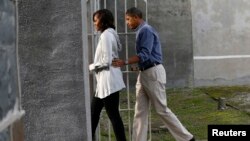CAPE TOWN, SOUTH AFRICA —
U.S. President Barack Obama and his family have toured Robben Island, the former prison off Cape Town, South Africa where Nelson Mandela was imprisoned for fighting to overturn apartheid.
Obama had visited Robben Island before as a U.S. senator but his return with his family on his three-nation Africa trip held special significance.
He spoke about that in remarks at a news conference in Johannesburg on Saturday.
"For me to be able to bring my daughters there and teach them the history of that place and this country, and help them to understand not only how those lessons apply to their own lives but also to their responsibilities in the future as citizens of the world, that’s a great privilege and a great honor," he said.
As he did in 2006 on his last visit, Obama spent some moments in the small jail cell where Nelson Mandela was held.
Guided by a former prisoner, the president and his family walked into a bleak limestone quarry where 34 leaders of the African National Congress, including Mandela, labored for decades.
In remarks overheard by media, he spoke to his daughters about the political non-violence movement pioneered by Mahatma Gandhi that took root in South Africa.
Obama's next stop was a youth center at the Desmond Tutu HIV Foundation. The foundation is named after and supported by Archbishop Desmond Tutu for AIDS prevention, tuberculosis screening and community health solutions.
The main event of Obama's visit Sunday is his speech at the University of Cape Town, framing his administration's Africa policy and approach to U.S. assistance and security cooperation.
White House Deputy National Security Adviser Ben Rhodes said the theme will be potential for change, framed around the legacy of Nelson Mandela for South Africa and the continent.
Obama is expected to refer to the “Ripple of Hope” speech at the university in 1966 by Robert F. Kennedy, after Mandela's imprisonment. In that speech, Kennedy spoke about people standing up for ideals and acting against injustice and oppression.
Obama will speak about three key themes of U.S. engagement with Africa - opportunity, democracy and peace and security.
Key areas include food security, and his global health agenda, including a goal of achieving an AIDS-free generation. Also, a new initiative called "Power Africa," aimed at doubling access to electricity in sub-Saharan Africa
Obama will speak about democratization in Africa and the importance of institution-building and civil society, and address challenges including the situation in Zimbabwe, and African-led solutions in places like Congo, Sudan and Somalia.
Finally, Obama will announce plans to hold a summit of leaders from across sub-Saharan Africa in Washington as a symbol of his intention to continue high-level engagement with the continent.
Obama had visited Robben Island before as a U.S. senator but his return with his family on his three-nation Africa trip held special significance.
He spoke about that in remarks at a news conference in Johannesburg on Saturday.
"For me to be able to bring my daughters there and teach them the history of that place and this country, and help them to understand not only how those lessons apply to their own lives but also to their responsibilities in the future as citizens of the world, that’s a great privilege and a great honor," he said.
As he did in 2006 on his last visit, Obama spent some moments in the small jail cell where Nelson Mandela was held.
Guided by a former prisoner, the president and his family walked into a bleak limestone quarry where 34 leaders of the African National Congress, including Mandela, labored for decades.
In remarks overheard by media, he spoke to his daughters about the political non-violence movement pioneered by Mahatma Gandhi that took root in South Africa.
Obama's next stop was a youth center at the Desmond Tutu HIV Foundation. The foundation is named after and supported by Archbishop Desmond Tutu for AIDS prevention, tuberculosis screening and community health solutions.
The main event of Obama's visit Sunday is his speech at the University of Cape Town, framing his administration's Africa policy and approach to U.S. assistance and security cooperation.
White House Deputy National Security Adviser Ben Rhodes said the theme will be potential for change, framed around the legacy of Nelson Mandela for South Africa and the continent.
Obama is expected to refer to the “Ripple of Hope” speech at the university in 1966 by Robert F. Kennedy, after Mandela's imprisonment. In that speech, Kennedy spoke about people standing up for ideals and acting against injustice and oppression.
Obama will speak about three key themes of U.S. engagement with Africa - opportunity, democracy and peace and security.
Key areas include food security, and his global health agenda, including a goal of achieving an AIDS-free generation. Also, a new initiative called "Power Africa," aimed at doubling access to electricity in sub-Saharan Africa
Obama will speak about democratization in Africa and the importance of institution-building and civil society, and address challenges including the situation in Zimbabwe, and African-led solutions in places like Congo, Sudan and Somalia.
Finally, Obama will announce plans to hold a summit of leaders from across sub-Saharan Africa in Washington as a symbol of his intention to continue high-level engagement with the continent.





